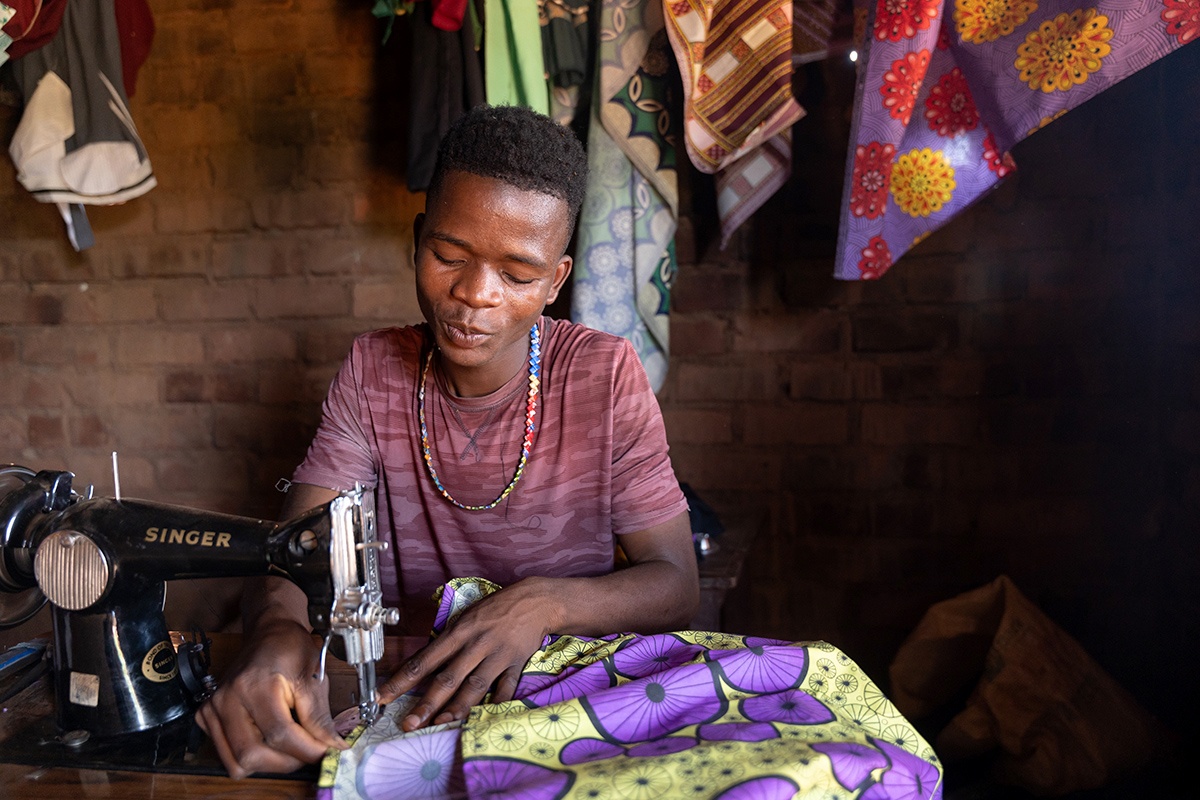Vocational Program Empowers Teens Living with HIV
In Malawi, teen-friendly services address wealth inequality, creating pathways to better health outcomes.
Posted on Aug 28, 2024

Malawi, one of the most impoverished countries in the world, has among the highest HIV infection rates and is home to a growing population of adolescents who are HIV-positive and facing challenges that go beyond physical health.
Burdened by poverty, social stigma, and lack of education, young people in the region living with the virus are often isolated from their community, less likely to take medications as prescribed, and discouraged from accessing vocational opportunities.
Recognizing that health is deeply intertwined with social and economic factors, Partners In Health (PIH) prioritizes the development of programs that go beyond modern medical care and address patients’ needs, including access to food, transportation, housing, and regular employment.
For Abwenzi Pa Za Umoyo (APZU), as PIH is known in Malawi, social support—meaning care that goes beyond clinical—plays a crucial role in building a stronger public health system. Grappling with significant health care challenges, like the HIV epidemic, has required an emphasis on community engagement and capacity building.
Building Economic Independence
In December 2022, APZU launched the ASPIRE project, a program aimed at equipping teenagers living with HIV with education and skills that would enable healthy decision making and economic mobility.
Supported by the Malawi Ministries of Health, Labor, Youth Development, Gender, Community Development, Social Welfare, Agriculture, and Education, ASPIRE implements a redesigned Teen Club curriculum in the Neno District’s 14 health facilities that ensures the support patients are provided extends beyond quality medical provision to include mental wellness support, vocational opportunities, and networking activities.
Through ASPIRE, teenagers in Neno ranging from ages 17 to 19 are trained in skills that include brick laying, tailoring, plumbing, and mechanics. Along with vocational education provided through Teen Clubs, program participants receive funding to start their own businesses in the areas they are trained.
According to Jimmy Harare, APZU’s associate director of community health, the goal of the ASPIRE project is to achieve long-term improvements in health and socioeconomic conditions for teens living with HIV in Malawi’s Neno District.
“For us to attain this,” he explained, “we’re looking into two thematic areas. The first one is to ensure we are improving access to quality HIV treatment services through the decentralized services we provide in Neno. The second thing is also ensuring that we are creating a socioeconomic opportunity for the adolescents that are living with HIV, so that at the end, they should be self-reliant and improve their economic pathway.”
Breaking the Cycle of Poverty
Nineteen-year-old Patrick Francis from the Tsoka Village in Neno is among several teens who have benefitted from the project. In 2023, Patrick was trained in tailoring. After completing his training, APZU provided him with business start-up capital, a sewing machine, 50 meters of cloth, measuring tapes, needles, scissors, and thread among other items to help kick-start his entrepreneurial journey.
Today, Francis is bringing convenience and craftsmanship closer to home, operating his business in the village, where residents previously travelled long distances for tailoring services. He currently earns around $40 each month through his business and is able to support his grandmother. This level of income is out of the ordinary for most people living in Malawi, where over half of the population still lives below the poverty line – earning less than $1 per day.
“Through the tailoring skills I attained with support from Abwenzi Pa Za Umoyo,” he said, “I am able to earn a living and look after my granny. This season I have managed to buy 15 bags of maize, which I want to sell. My aim is to buy a motorcycle to ease my mobility to and from Mwanza, where I buy material for my tailoring.”
Once acquired, Francis plans to use his motorcycle to also operate a kabaza (bicycle) business, offering people in his community a flexible and affordable means of transportation to areas where vehicles cannot reach due to the terrain. He has also been able to purchase other items for his home and business including solar panels, pigeons to address the problem of food scarcity, and a public address system that community members can rent for weddings and other events, providing Francis with another avenue for income.
Expanding the Program
The ASPIRE project will allow APZU to expand programming and continue implementing a range of initiatives focused on education and career guidance to empower teens living with HIV in Malawi, improving their physical health and helping them secure the basic conditions needed to realize their potential. These efforts, which will now have a greater impact due to increased funding, include the facilitation of internships, job shadowing, volunteer opportunities, as well as a local youth forum providing life skills training.
Moreover, the project will incorporate guidance on sexual and reproductive health and rights—with a special emphasis on sexual and gender-based violence, which is prevalent in the region and disproportionally affects girls and young women.
Focusing on the whole person and not just their illness, ASPIRE aims to address the community’s immediate health care needs and lay the foundation for a brighter future. The project seeks to reach a 90% retention rate for teenagers in care by 2025.

